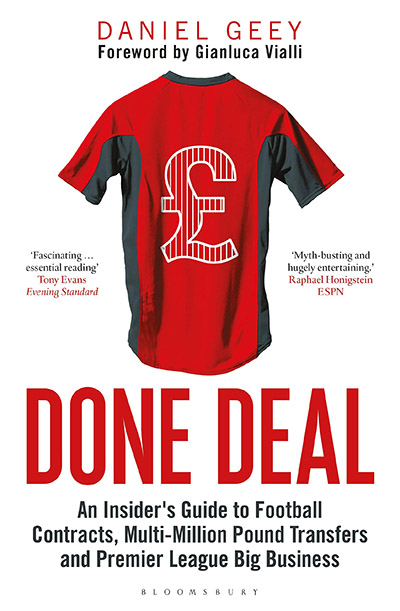
Bloomsbury, £16.99
Reviewed by Charles Morris
From WSC 385, April 2019
Buy the book
When Neymar played for Barcelona his contract stipulated that his Brazilian friends would be flown to the city every two months for an all-expenses paid holiday. Such largesse captures the essence of leading sports lawyer Daniel Geey’s book – the way football has been transformed into a multi-billion-pound business with money to burn. This began with the Premier League’s formation in 1992 coinciding with Rupert Murdoch’s new satellite subscription television service, BSkyB, which needed attractive content. From 1988-92 ITV had paid £11 million a season to show 18 live Football League matches, whereas from 2016-19 Premier League clubs are receiving £2.8 billion a season from global broadcasting deals. Sponsorship and other commercial incomes have multiplied in similar fashion.
Geey’s relating of this transformation makes a fine textbook on the subject. Business students will find all they need to know about player contracts, transfers, broadcasting rights, sponsorship and club takeovers, and some details are fascinating. Top Premier League players can gain bonuses of £3,000 and £5,000 or more for, respectively, an assist or goal, and defenders are similarly rewarded for clean sheets. Also, UEFA’s latest benchmarking report states that “more than 70 per cent of all foreign takeovers in the top 15 leagues since 2016 have involved Chinese investors”.
The textbook style, however, soon becomes wearing. The prose is leaden, containing bullet points galore and is sometimes too detailed or repetitive. The huge tax advantages of players forming image-rights companies, for instance, needs telling only once. Yet what eventually proves most grating is Geey’s entirely uncritical view of football’s financial activity.
That nine of the Premier League’s 20 shirt sponsors are betting companies and the Football League is sponsored by Sky Bet passes without comment, despite widespread societal concerns about gambling addiction, which footballers themselves are falling prey to. He writes how well English rules governing who can own a club have worked, but ignores the numerous instances of owners running clubs into the ground or severely harming them.
Geey’s greatest cheerleading, however, is for agents. He argues rightly that the best possess intricate football knowledge, impressive negotiating and mediating skills, and fulfil a necessary role. There is no condemnation, however, of the blatant conflict of interest when agents act for both player and club, nor of the massive sums they extract from the game. He notes that according to UEFA more than €3bn was paid to agents from 2013-17, and Premier League clubs collectively paid them £211m during the 2017-18 summer and winter transfer windows alone. He justifies limply Mino Raiola’s £40m cut from Paul Pogba’s transfer from Juventus to Manchester United because it took “many months to structure” and involved “detailed and nuanced negotiations”. Geey waits 230 pages to express a strong opinion, which is to oppose consideration by FIFA and UEFA of capping agents’ commissions.
The book’s information about the author’s legal work perhaps explains the bland deference towards all concerned in football. He has represented clubs, players, agents, broadcasters and footballing authorities – and presumably intends to continue doing so.